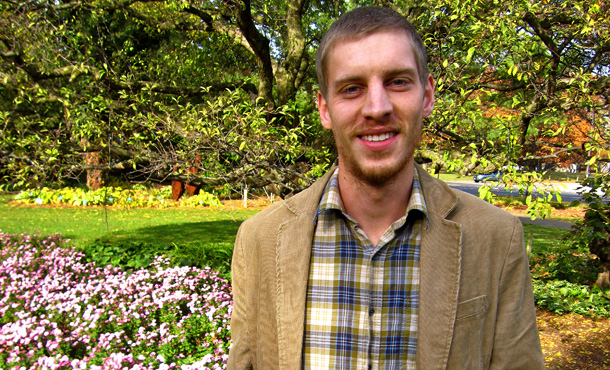The use of antiquated means to value and develop land always puzzled Eastern Mennonite University (EMU) alum, Matt Gnagey ’05.
Gnagey went to work to find answers, spending two years in research, culminating in a 2011 Agricultural, Environmental and Development Economics (AEDE) Best Doctoral Research Manuscript award. The award is based on Gnagey’s work as a graduate student at The Ohio State University for his paper, “A Semi-Parametric Analysis of Land Developer Costs and Development Timing.”
“My current research goal is to study changes in rural land use, specifically conversion of agriculture land to residential housing,” said Gnagey. “Greater understanding of development patterns and regulatory policies generate ways to better plan communities while also achieving more efficient economic outcomes.”
Gnagey used a statistical technique that relies less on economic assumptions-and more on incorporating geographical features in environmentally sensitive areas-to analyze land developer’s decisions of the timing and location of subdivisions in a rural Maryland county, close to the Chesapeake Bay.
“The goal of this research is to model changes in land use, particularly the conversion of agricultural land to residential housing,” said Gnagey. “Policies have been implemented to control fragmentation and potential damages to the ecosystem, but they are understudied. If we can understand how communities have grown in the past we can encourage economic growth and preserve the environment and natural resources for the future.”
Gnagey hopes the data he collects will show where land developers subdivide land and the characteristics that lead to those decisions. “I will include variables such as the characteristics of developers, land and the surrounding land while using new spatial statistical techniques to further explain development patters better than prior research has been able to.”
Chris Gingrich, professor of Business and economics at EMU, said Gnagey’s work at EMU and time with Mennonite Central Committee helped him further understand land development issues. “His work in Indonesia following the 2004 tsunami undoubtedly helped him understand the economics of daily household decisions amidst challenging circumstances.”
Gnagey, who praised his adviser and fellow graduate students for their support on this research, emphasized his work is far from over.
“My manuscript still needs improvements before it can contribute to academic journals, but this award confirms that I am on the right track,” sad Gnagey.
Following the completion of his PhD, Gnagey envisions applying for jobs at liberal arts universities.
“Liberal arts schools often require professors to undertake a significant teaching load, but many of my professors at EMU demonstrated balance between a full-time teaching load and quality academic research, something I aspire to.”
More information on the Business and economics department can be found at emu.edu/business.
To view an interview with Chris Gingrich visit WHSV/TV3.
